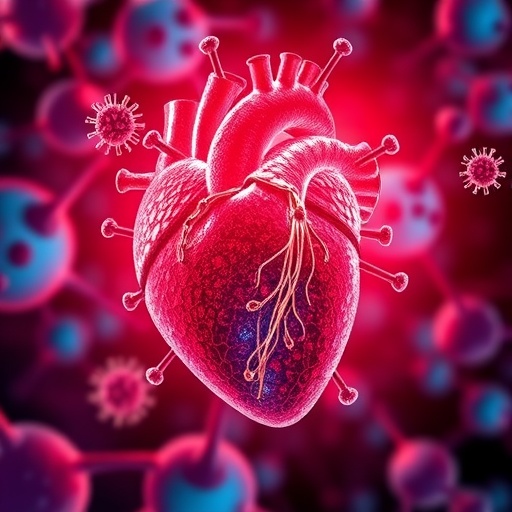The relationship between the gut microbiome and cardiovascular health has captivated researchers for decades, but an emerging biomarker, trimethylamine N-oxide (TMAO), has recently taken center stage in discussions surrounding atherosclerosis and myocardial infarction. The multifaceted implications of TMAO, microRNAs, and the interplay of oral and gut microbiomes have prompted a systematic review, shedding light on their mechanistic roles and providing translational opportunities that may revolutionize the management of cardiovascular diseases.
TMAO is a compound produced when gut bacteria metabolize certain nutrients, particularly choline, L-carnitine, and betaine, which are found abundantly in animal products. One of the central tenets of this research is the understanding of how elevated TMAO levels are associated with an increased risk of cardiovascular events, including heart attacks. This correlation raises crucial questions about the underlying biological mechanisms that connect TMAO with arterial plaque formation and subsequent myocardial infarctions.
Recent studies reviewed in this systematic exploration reveal a complex relationship between TMAO and the host metabolism. High levels of dietary intake of foods rich in choline can lead to a surge in TMAO production, thus one might wonder how diet modifications could mitigate cardiovascular risks. It was revealed that a holistic approach, where dietary patterns are adjusted in conjunction with therapeutic interventions, might offer a pathway toward lowering TMAO levels and, consequently, cardiovascular risk.
MicroRNAs (miRNAs)—small non-coding RNA molecules that regulate gene expression—are another focal point of this investigation. Their role in cardiovascular health has garnered significant attention as they can influence numerous processes, including inflammation, oxidative stress, and apoptosis. The review highlighted multiple studies showing that altered miRNA profiles could be linked to changes in TMAO levels and the overall health of the gut microbiome, suggesting a potential biomarker for assessing the predisposition of individuals to cardiovascular diseases.
The modulation of microRNA expression by TMAO introduces an intriguing aspect of this research. Scientists believe that TMAO may influence miRNA pathways that regulate vascular function and lipid metabolism. For example, specific miRNAs have been identified as markers of inflammation, which is a critical component in the pathogenesis of atherosclerosis. Understanding these interactions lays the groundwork for potential therapeutic strategies targeting miRNAs to modulate cardiovascular risk.
Moreover, the role of the oral microbiome in TMAO production cannot be overstated. Several enzymes produced by oral bacteria are implicated in the conversion of dietary substrates into TMA, the precursor of TMAO. Thus, the health of one’s oral microbiome can dramatically influence TMAO levels and, ultimately, cardiovascular outcomes. Preventive health measures aimed at maintaining a healthy oral microbiome could play a significant role in reducing the risk of heart disease.
Studies indicate that individuals with a robust and diverse gut microbiome may naturally exhibit lower levels of TMAO. This observation raises the question of how one might enhance gut microbial diversity through dietary modifications and prebiotic or probiotic interventions. With an increasing understanding of the connections between diet, microbiome health, and cardiovascular diseases, researchers are optimistic that dietary recommendations tailored to enhance gut health could serve as a preventive strategy against heart-related ailments.
As the research unfolds, it becomes clear that there is much at stake. The findings open up avenues for personalized medicine in cardiovascular care, where dietary patterns, microbiome health, and genetic predispositions could be taken into account to devise optimal prevention and treatment plans. This notion of tailoring health interventions based on individual microbiome composition aligns with the emerging paradigm of personalized healthcare.
Importantly, the implications of this review extend beyond merely identifying risk factors for cardiovascular events. There lies a profound opportunity for translational research that takes the knowledge gleaned from microbiome studies and integrates it into clinical practice. The exploration of TMAO, microRNAs, and their interactions with the microbiome underscores an exciting frontier in cardiovascular health that promises to redefine understanding and intervention strategies.
However, there remain unresolved questions that warrant further investigation. For instance, the precise mechanisms through which TMAO modifies miRNA expression and impacts cardiovascular health are yet to be fully elucidated. Understanding these dynamics will be crucial for developing targeted therapies that could mitigate the risk associated with elevated TMAO levels.
In conclusion, the systematic review on TMAO, microRNAs, and the intertwining roles of the oral and gut microbiomes represents a major step forward in cardiovascular research. As scientists continue to disentangle the web of interactions at play, the potential for novel therapeutic strategies and dietary recommendations emerges brightly on the horizon, potentially paving the way for new paradigms in the prevention and management of cardiovascular diseases.
While the research ecosystem is evolving rapidly, the integration of microbiome science into cardiovascular care may soon transform how we understand and approach heart health. As patients, healthcare providers, and researchers align towards this goal, the hope for improved cardiovascular health outcomes becomes ever more tangible.
Subject of Research: The relationship between TMAO, microRNAs, and the oral/gut microbiomes in atherosclerosis and myocardial infarction.
Article Title: A systematic review of TMAO, microRNAs, and the oral/gut microbiomes in atherosclerosis and myocardial infarction: mechanistic insights and translational opportunities.
Article References:
Motte, L.R.D.L., Giarritiello, F., Sala, L.L. et al. A systematic review of TMAO, microRNAs, and the oral/gut microbiomes in atherosclerosis and myocardial infarction: mechanistic insights and translational opportunities.
J Transl Med 23, 1269 (2025). https://doi.org/10.1186/s12967-025-07224-5
Image Credits: AI Generated
DOI: https://doi.org/10.1186/s12967-025-07224-5
Keywords: TMAO, microRNAs, gut microbiome, cardiovascular health, atherosclerosis, myocardial infarction, personalized medicine, diet, oral microbiome, inflammation, oxidative stress, gene regulation, translational research.




